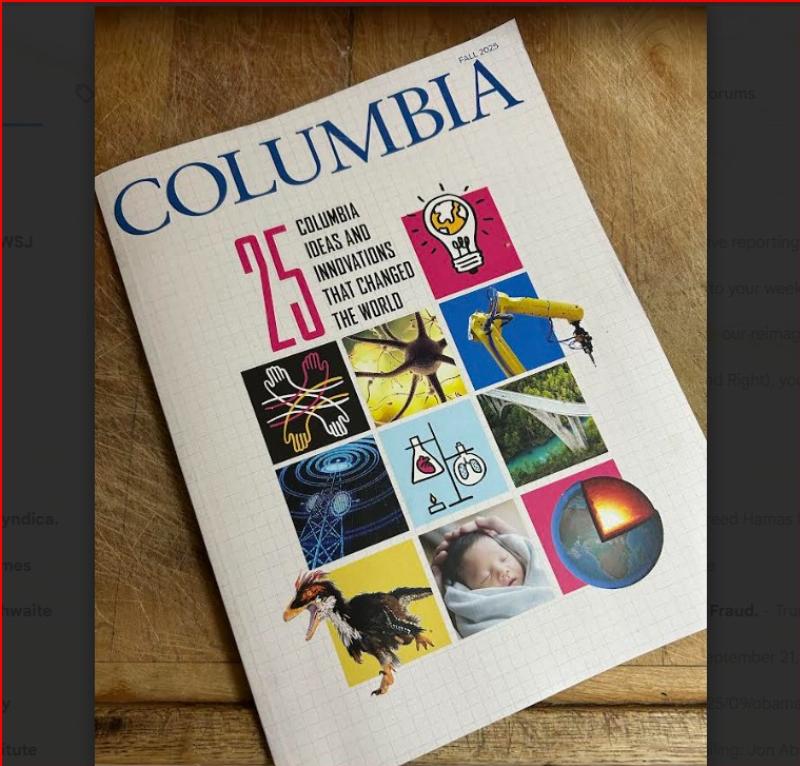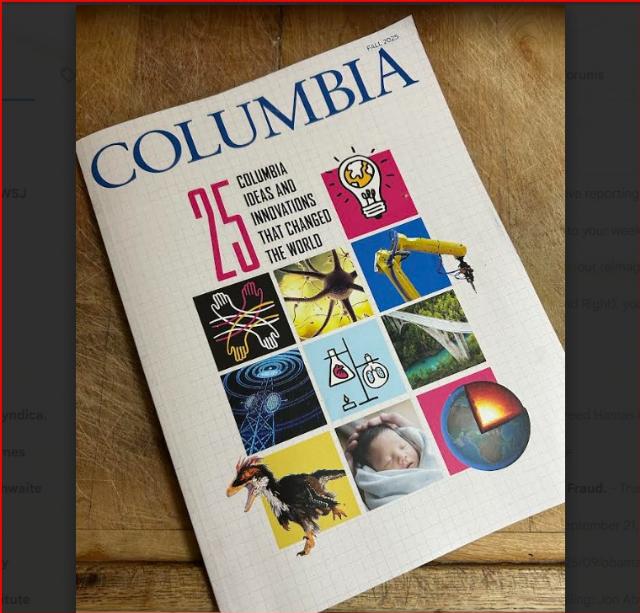


Despite the chaos and unrest you may associate with Columbia University based on the news, the school actually has a storied list of world-class achievements across a plethora of demanding fields.
I got alumni magazine, Columbia, in the mail and it tried to list them. The cover story was "25 Columbia Ideas and Innovations that Changed the World."
It started out well enough:
Like its Ivy League peers, Columbia started out as a sleepy institution focused on teaching history and literature to undergraduates — a model of higher education typical of eighteenth-century colleges on both sides of the Atlantic. But its location in New York City, the future industrial hub of America, soon pushed it to broaden its mission. In the early years of the republic, when the city needed physicians, lawyers, and other professionals to serve its rapidly growing population, Columbia expanded its curricula to train them. When, at the dawn of the industrial era, the US needed engineers to build the infrastructure for a modern economy — from bridges and railways to aqueducts and factories — the University established one of the country's first engineering schools. And when sanitation, infectious disease, labor conditions, and ethnic tensions became defining challenges for cities nationwide, Columbia launched new graduate programs in areas like political science, journalism, public health, and social work.
By the turn of the twentieth century, most Americans’ lives had already been improved in one way or another by Columbians’ ingenuity and idealism.
It named some prominent alumni, and then got into a thumbnail sketch of 25 accomplishments, most of them stellar that indeed have changed the way we live, among them, the gene sequence, creating the whole new field of genetic medicine; data processing; FM radio; blood banks; bone-marrow transplants; the discovery of bacitracin, the key ingredient in NeoSporin, which can kill bacteria that penicillin cannot; value investing, plate tectonics; industrial robots, the discovery that dinosaurs are birds (or more properly, birds are dinosaurs) -- everyone needs to know that! There was neuroplasticity, seasonal forecasts, reliable internet and video, real-time monitoring of bridges, buildings, and dams (why did that rank 23? It seems kind of important, actually); and lab grown organs.
You get the idea -- this is heavy, stellar, achievement.
And then there were the clinkers, the dogs, one of which was Joe Stiglitz's idea that GDP need no longer objectively measure output, one could include "happiness" in the calculation of GDP instead, a useless idea that normally is used to cover up the failures of socialism, which cannot produce the way capitalism can.
Another was "wars of perception." The thumbnail summary of it begins this way:
Then they unwittingly blew up their own argument for it, by citing its use in Joe Biden's foreign policy.
Umm, that's an advertisement against the idea, boys.
Global warming, the fraud filled, failed idea behind the greenie craze strangling the West got its spot in the sun. Some good ideas were there, too, such as the advances against maternal mortality. Yes, yes, yes.
Then there was DEI, which the university claimed credit for inventing, calling it "the embrace of cultural diversity." The description started out like this:
One hundred years ago, many scholars gave intellectual cover to white Europeans and Americans who saw themselves as superior to other groups, claiming that intelligence, moral character, and nearly every other aspect of human potential was determined by race and ethnicity.Franz Boas 1929HON, a cultural anthropologist who taught at Columbia from 1896 to 1936, did more than any other academic to dismantle that myth. Through his empirical studies of Indigenous peoples and immigrant communities in North America, he demonstrated that human behavior is shaped primarily by culture and environment, and that biological differences between groups have no significant bearing on how people think or act.
O.K. not a problem: The reaction was to Democrats like Woodrow Wilson, a flaming racist who resegregated the government against black people who had accomplished so much in the post-slavery Reconstruction era, trying to stomp them down as inferior.
It also was a reaction to the Jubal Early-style Southern revanchists, desperate to romanticize and justify what their side stood for during the Civil War. On those grounds the idea was perfectly right.
But the diversity idea kept morphing and it soon became a monster, triggering grievance politics, race shakedowns from NGO hustlers, the 1619 Project which amounted to a grand revision of American history as hopelessly flawed and beyond redemption -- and was loaded with error -- and a culture of victims as heros.
That brought us to today's DEI, which has seen ignorant fools placed in positions of authority, on courts in hospitals, and in industry, merit yielding to skin color in a sort of reverse racism.
And where did they rank it: A number two, bested only by genetics.
Better than bacitracin? Take a back seat. Better than bridge and dam monitoring? Way more important! Better than blood banks and bone marrow transplants? They cannot hold a candle to DEI.
You can see there's a values issue here -- the university remains hopelessly woke, valuing DEI over actual achievements. Whoever ordered that list ought to be fired.

Image: Monica Showalter
